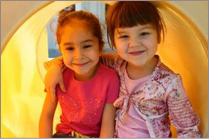Primary & Supervised Providers
An agency or person engaged in intercountry adoptions does not necessarily have to apply for accreditation or approval to perform adoption services in Convention adoptions. It may instead choose to work under the supervision of another provider that is accredited or approved, or to provide only certain limited services that may be provided in Convention cases without being accredited or approved or supervised. It may also choose to provide services only in cases not subject to the Convention.
In every Convention adoption case, an accredited agency or approved person must be identified as responsible for ensuring that the six adoption services are provided. This agency or person is called the primary provider. If the primary provider relies upon an outside individual or another organization to carry out one or more of the adoption services, that individual or organization must generally operate under the supervision of the primary provider. These individuals and organizations are called supervised providers. Supervised providers may be agents, facilitators, attorneys, or other organizations working either in the United States or a foreign country. Supervised providers are not required to be accredited or approved. They must, however, be supervised by a primary provider.
Exceptions to Supervised Provider Rule
There are some exceptions to the supervised provider rule. The following are not required to be accredited or approved, or to operate as a supervised provider to provide some or all of the six adoption services:
- State, local, or tribal governmental authorities in the United States (called public domestic authorities in the accreditation regulations)
- Central Authorities or other public authorities in Convention countries
- Prospective adoptive parent(s) acting on their own behalf
- A social work professional or organization that performs a home study or a child background study in the United States in connection with a Convention adoption, but that has not provided and is not currently providing any of the other five adoption services in the case (an exempted provider). The study still must be approved in accordance with the accreditation regulations.
- Any foreign provider obtaining consents or performing a child background study and report (in incoming cases) or a home study and report (in outgoing cases) if its work is verified in accordance with the accreditation regulations. (NOTE: This exception recognizes that some services will often be performed overseas before a U.S. primary provider has been identified, making contemporaneous supervision of the provider impractical.)
Organizations or individuals that do not provide any of the six adoption services may also work on a Convention case without being accredited, approved, or supervised. For example:
- Attorneys or organizations that provide legal services in connection with a Convention case (e.g., drawing up contracts and powers of attorney) but that provide none of the six adoption services
- Individuals or organizations that provide child welfare services in connection with a Convention adoption case (e.g., recruiting and identifying adoptive parent(s) in the case of a disruption; arranging or providing temporary foster care for a child; education, social, cultural, medical, psychological assessment, mental health, or other health-related services)
Examples of who must be accredited approved, or supervised can be found in section 96.15 of the accreditation regulations.
Determining the Primary Provider
When more than one accredited agencies or approved persons are providing adoption services in a single Convention case, the agency or person with child placement responsibility must act as the primary provider (22 CFR 96.14(a)).
The burden is on the accredited or approved adoption service providers to agree among themselves as to who the primary provider is in each Convention case. To make this decision, the adoption service providers should consult 22 CFR 96.14(a).




